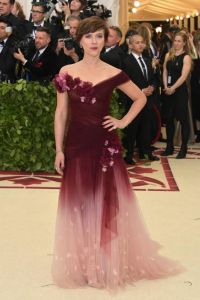Group Gordon’s Minari Karunatilake blogs about reclaiming brand image after a crisis.

The brand’s dream dresses were red carpet staples, worn by celebrities at the pinnacle of Hollywood stardom. That was Marchesa then, before it was sucked into a nightmare following abuse, assault, and harassment allegations against Harvey Weinstein in October 2017. These allegations included revelations that Weinstein had bullied actresses into wearing the brand, which was founded by Weinstein’s ex-wife Georgina Chapman and Keren Craig. Overnight and until very recently, Marchesa became associated with Weinstein’s disgrace and all but disappeared from red carpets where it had once been ubiquitous.
The way Weinstein used Marchesa had damaged its brand image. He was billed as the “mastermind” behind Marchesa, and people speculated that it would not have reached the same level of success without his influence in fashion and media. There were questions about Chapman’s complicity in Weinstein’s depraved behavior. Celebrities avoided the brand on the red carpet. People questioned whether or not the brand could regain its reputation after being dragged in Weinstein’s dirt. The fashion community and public watched to see how Marchesa and its founders would reclaim the brand. Only recently have we seen the brand’s redemption begin to take hold. How did Marchesa’s founders get the brand back on track? The strategy is classic PR crisis management.
Chapman immediately distanced herself from Weinstein and condemned his behavior, severing ties in a personal sense as well as a business one. When people questioned her complicity in Weinstein’s wrongs, her quick and contrite statement focused on support for the women affected and media privacy for her children.
In the aftermath of the Weinstein revelations, Chapman and Craig took time to reconsider the direction in which to take Marchesa, doing so out of the public eye. The brand skipped New York Fashion Week for Fall 2018 in favor of a digital presentation. In lieu of a public fashion show, Marchesa privately showed its Spring 2018 Bridal collection to buyers and select press only. Chapman and Craig also removed Marchesa dresses from the red carpets, stating, ‘it was time to step back from that.’ During this time, the Weinstein scandal continued to build with new allegations piling up. By staying out of the spotlight, Marchesa also avoided unnecessary attention and possible association with Weinstein’s misdeeds as the story went through the news cycle.
Marchesa reemerged recently to show its Spring 2019 Bridal collection. The collection, which was received favorably, was judged on its design merits instead of its connection to the Weinstein. This could be an indication that the fashion community’s sentiment of the brand has shifted.
While Marchesa and Craig issued statements of support for Time’s Up and #MeToo, Chapman remained quiet on the subject until last week, when she gave an interview for June’s Vogue, her first since the scandal broke in October 2017.
The outlet was a wise choice for Chapman: Vogue is regarded as an authority and arbiter in the fashion community, an important audience whose support Chapman and Marchesa needed to win back. A golden opportunity to tell her side of the story in her own words, with her own framing, and contextualized according to her perspective, Chapman needed to nail the tone and her messages for the interview. She did this in a few ways.
In the interview, Chapman made clear where her allegiances and sympathy lie. She was not defensive or adversarial about the fallout from the Weinstein scandal, instead acknowledging the irreparable damage her former husband had inflicted on his victims through his actions, including by using Marchesa. She explained her decision to take Marchesa dresses off the red carpet as a show of support for them and for women’s rights movements.
The Vogue profile also humanized Chapman for its readers, revealing more about Chapman’s early life and the road to building Marchesa, as well as details about her as a mother and friend. As the higher profile face of Marchesa, Chapman is synonymous with the brand in many ways. By inviting readers to better understand her, Chapman not only took steps to redeem her own image, but also to redeem Marchesa and those affiliated with it in the eyes of the fashion community.
Marchesa reemerged on the red carpet for the first time since the allegations broke at the 2018 Met Gala, where Scarlett Johansson, a vocal supporter of the #MeToo and Time’s Up movements, wore one of the brand’s designs. Johansson made a statement of support of Marchesa, asserting her pride to support the brand and its “two incredibly talented and important female designers.” Anna Wintour also endorsed the brand, as well as Chapman’s character, in the Editor’s Letter in June’s Vogue. As fashion and Hollywood powerhouses, Johannson and Wintour are influential amongboth the industry and the public, making them incredibly valuable third-party validators. It was critical for Marchesa to receive support from both of these groups to continue the brand’s recovery.
Some may still see Chapman as complicit in Weinstein’s actions for the business benefit to Marchesa. Others may question whether boycotting a women-owned brand for the wrongs of a man runs counter to the values at the very heart of the #MeToo and Time’s Up movements. In the court of public opinion, Marchesa’s comeback is still the subject of debate and judgement. While the brand has moved forward in confronting challenges to its image, it will continue to face hurdles in restoring its image. But, with a thoughtful PR strategy, Chapman and Craig can continue their quest to pull the Marchesa brand out of Weinstein’s shadow of misogyny and back into the spotlight, on its own merits.